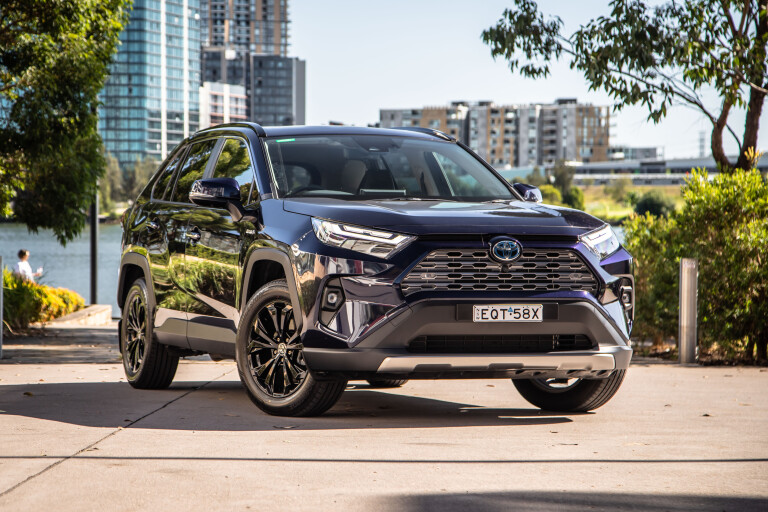
Score breakdown
Things we like
- Frugal and pokey hybrid propulsion
- Enticing ownership credentials
- Roomy and comfy cabin
- Fine ride and handling balance
Not so much
- Outdated infotainment
- The wait on delivery
- Powertrain gruff under load
- Slim towing credentials
UPDATE, November 23: 2023 Toyota RAV4 pricing announced
Australian pricing and specs for the updated 2023 Toyota RAV4 have been announced. Get all the details at the link below.
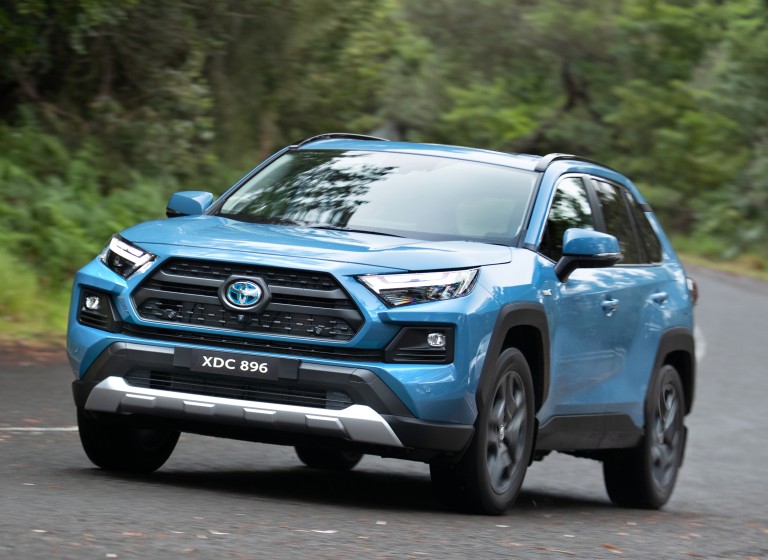
STORY CONTINUES: 2022 Toyota RAV4 Cruiser Hybrid 2WD review
Having Australia’s top-selling passenger car and holding enough forward orders to issue a 12-month delivery wait is cause for celebration. If you’re Toyota. Less so, perhaps, for eager and presumably patient prospective owners of the 2022 Toyota RAV4, property so hot it’s become the bullseye of the new-car delay dartboard.
Fanning demand flames further is the expanded and revised MY22 range: refreshed styling, equipment tweaks and the addition of a new mid-spec hybrid-only XSE.
Petrol-electric motivation, accounting for around 75 per cent of RAV4s sold (or ordered), can now be had across every one of the mid-sized SUV’s five trim tiers.
And that’s just the start. Toyota is also due to roll out a new multimedia format by year’s end – perhaps as a broader MY23 update – that will finally put the current, familiar and achingly passé infotainment regime to pasture.
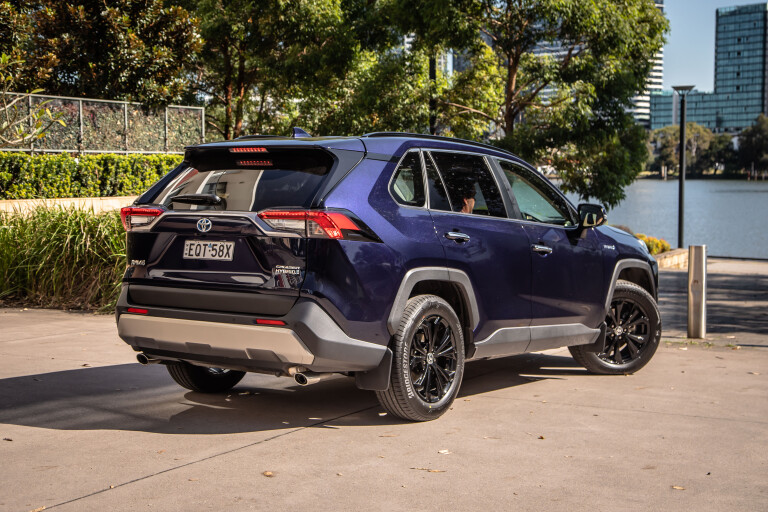
With unofficial murmurings that wait times for RAV4s could be shortening, exactly what you get if you order one now appears to be a little bit more of a crapshoot than it once was.
Regardless, the revised MY22 Cruiser Hybrid 2WD on test here arrives with more upgrades (and a stiffer price hike) than found elsewhere in the RAV4 range. Its plumper features list pushes the penultimate variant upmarket a little, unsurprisingly giving the new XSE mid-ranger sat below it some extra breathing space.
Regardless, there’s a fair case that, on paper, the fancier Cruiser, in bum-dragging petrol-electric guise, is just about the sweetest spot across the RAV4’s 13-strong line-up, offering goodness tailor-fit for Aussie taste in an SUV package that, on sheer popularity alone, couldn’t hit the mark any truer.
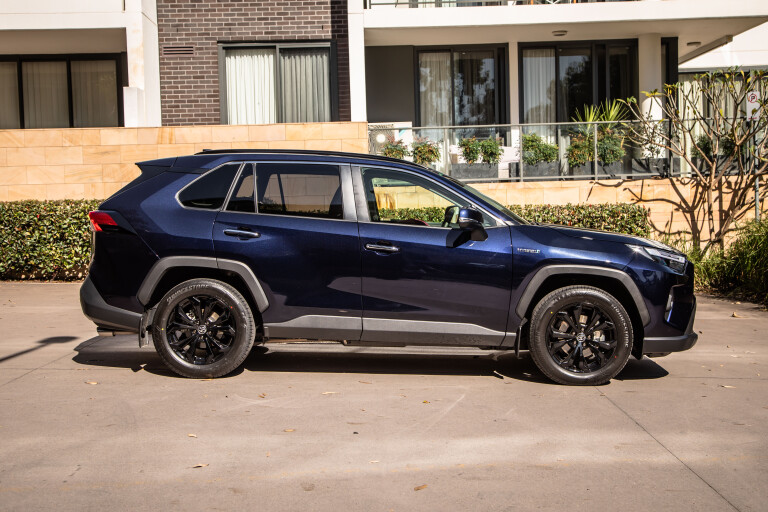
Pricing and features
The MY22 update tickled some RAV4 variants more than others, though subtle front-end massaging, with hybrids now fitting projector-type headlights and LED foglights.
New wheel designs are the most conspicuous aesthetic change, bringing a classier vibe to the likes of the lower-rung GXL, for instance.
Read our full story here for the complete range rundown.
The Cruiser? Pricing rose for MY22 by $750, pegging our hybrid front-driver at $45,750 before on-road costs, some $2500 pricier than the petrol version and $3000 under the all-wheel-drive hybrid version.
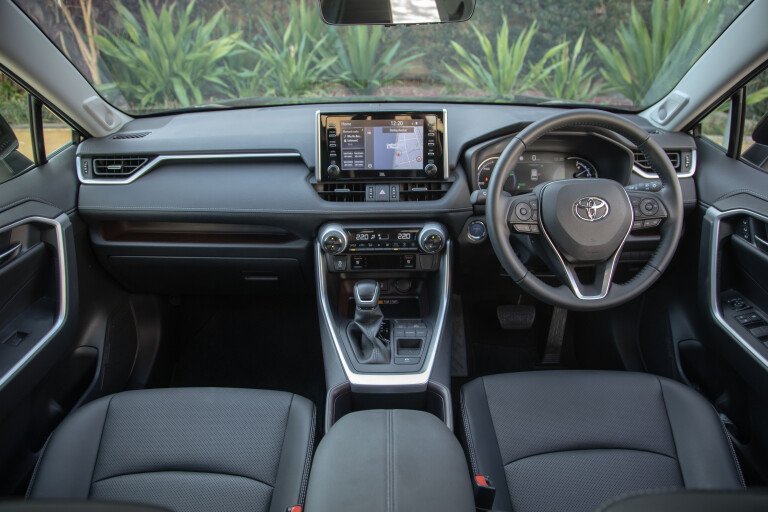
New additions to brim the Cruiser goodies bag include eight-way power adjustment, heating and ventilation for both front seats and a new digital camera-based rear-view mirror.
Opting for a hybrid version brings a new gloss black 18-inch wheel design, while petrol versions of the Cruiser get 19s.
That’s fresh sweetener atop carryover Cruiser spec that separates itself from lower grade RAV4s with features such as leather trim, auto-power folding mirrors, a powered sunroof, ambient lighting, a surround camera system with front camera view and a nine-speaker JBL sound system.
Other niceties such as the extended leather/leatherette door trims, powered tailgate and the high-grade 7.0-inch ‘supervision’ driver’s display were Cruiser exclusives until Toyota slipped them into the newcomer XSE as well.
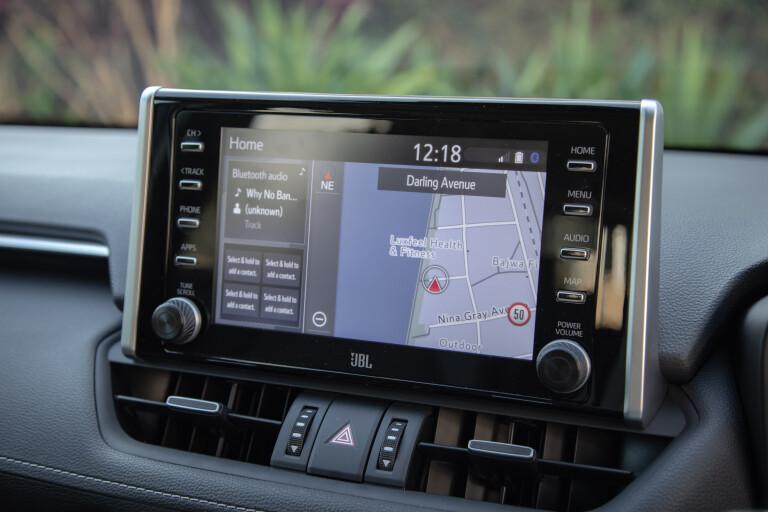
Somewhat make-do at the high end of the RAV4 range is an 8.0-inch touchscreen infotainment system with DAB+ digital radio, sat-nav and wired Apple CarPlay and Android Auto – plus five USB-A ports – that’s offered range-wide, right down to the base GX.
Inductive phone charging and dual-zone climate control are also fitted on all versions from the GXL up.
The RAV4 wears a five-star ANCAP rating based on 2019 assessment and features Toyota’s ‘Safety Sense’ suite.
Those safety features include auto emergency braking with pedestrian and daytime cyclist detection, blind-spot monitoring, lane departure warning, lane tracing assist, rear-cross traffic alert, adaptive cruise with stop/go and traffic sign recognition.
Omitted from the assistance list are rear cross-traffic assist and parking brake support – via auto braking forward or reverse – as featured exclusively on the top-grade Edge. Airbag coverage includes front, front-side, curtain and driver’s knee coverage.
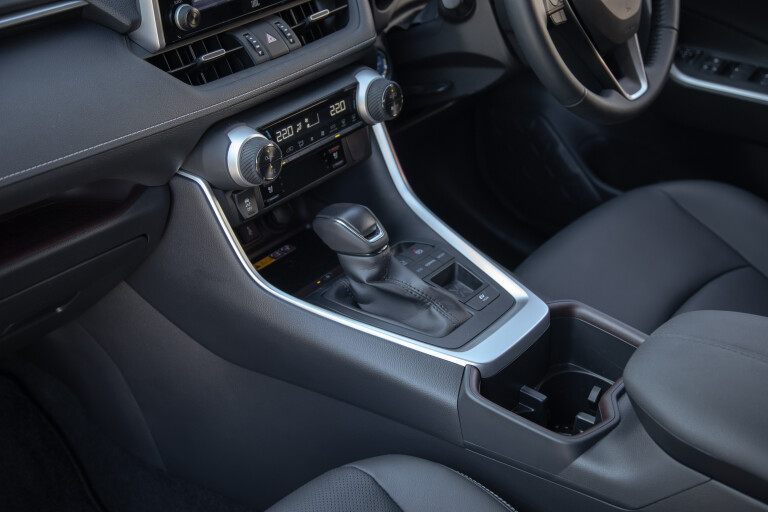
Comfort and space
Chunky and solid exterior looks are mirrored in feel once you climb into the RAV4. While some of its Toyota stablemates feel generally undercooked (HiLux), old hat (LandCruiser) or overly quirky (Yaris Cross), the mid-sized SUV range presents as relatively clean and straightforward, distinctive in its own right yet nicely resolved and fuss-free.
The ambience balances roomy airiness and a sense of sportiness injected by hunkered seating and a prominent dash and centre console, without robbing from sound ergonomics or clarity of outward vision. And yet it maintains a robust vibe that implies there’s ample metal cocooning its occupants.
It’s deceptively clever in design, a cabin space that’s conspicuously well packaged and amply spacious.
Some material choices won’t leave Lexus losing sleep, with its leather and leatherette more hardy than sumptuous, though ample solidity in the RAV4's control and switchgear and most touchpoints are plaint and tactile.
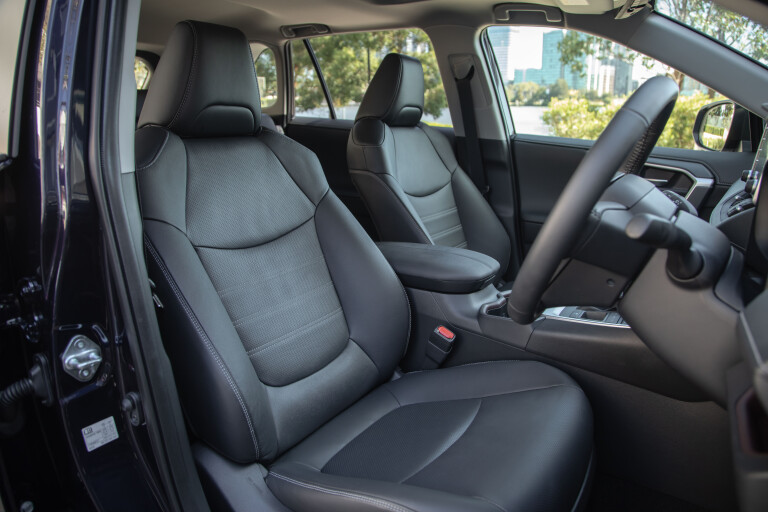
Interestingly, the Softex premium faux hide used in the higher-grade Edge is also plied in the XSE sat below the Cruiser, though there’s little about our test subject that you’d call certifiably lower rent, though some plastics are quite rudimentary.
The seating is comfy and almost lounge-like, with lots of scope for tailor-fit adjustment. Bringing a touch of celebration is the nice rubber knurled climate control and audio dials, while the partial analogue ‘supervision’ instrumentation is clear and pleasing if not nearly as tech-fancy or content-rich as a proper digital display.
Storage is ample, with dual USB-A ports tucked in the deep console bin, while door bins, cup holders and the inductive phone charge pad are all generously sized.
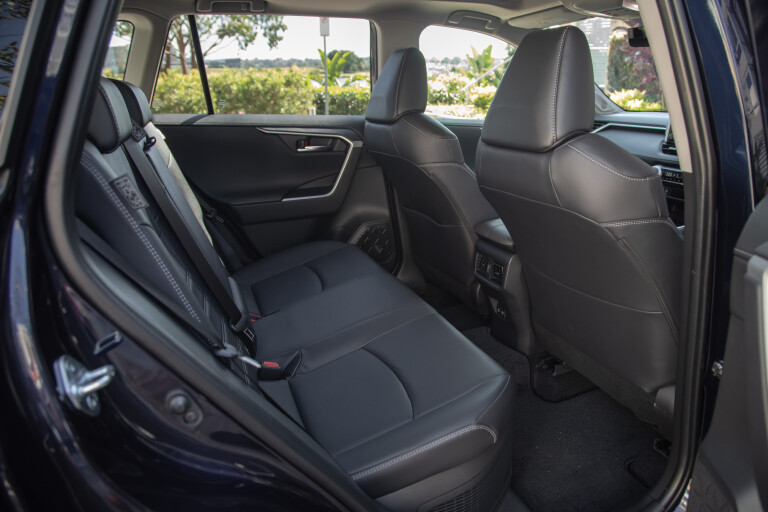
Infotainment continues to drag down the RAV4’s high average – again, a wholesale upgrade is coming within the year – and there’s little doubt a format closer to that favoured by Korean rivals will bring a significant lift in interior presentation and multimedia usability.
The long-suffering 8.0-inch unit remains clunky to use, slow in response and patently low-brow in display quality. Its feature set ticks all of the requisite boxes, though it just doesn’t do anything particularly well, from Bluetooth call quality to the resolution of the surround cameras and through to its frustrating sat-nav interface.
Pluses, though, are that smartphone mirroring works as expected and the physical buttons and dials in the touchscreen frame offer ever-handy function shortcuts.
The RAV4’s airy vibe and genuine roominess follows through to row two. Head and knee room are exacerbated somewhat by a low rear seat base and there’s just enough cabin width to offer five-adult accommodation.
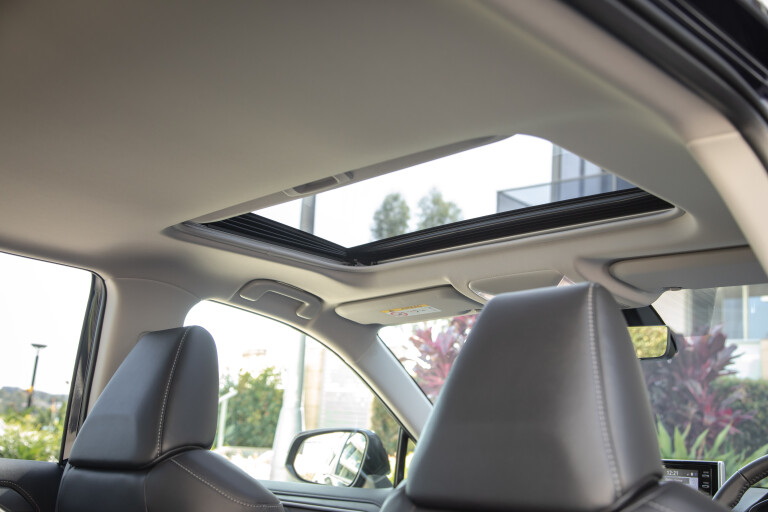
The rear bench is both comfy and supportive enough for long-haul occupancy and as a four-seater it brings a complete array of features that includes dual USB-A ports, air vents in the rear of the centre console, decent door bins and dual cup holders in the fold-down armrest.
Isofix mounts are located in the outboard positions and there’s ample clearance to access and install or remove child capsules without back-aching contortion.
Its versatile luggage space offers a decent 580 litres, complete with a dual-level floor you can set to taste. The 60:40-split rear seatbacks fold to create a nicely flat load area as a two-seater – Toyota doesn’t quote expanded volume – and the cargo area fits neat conveniences such as tiedown points, netted storage cubbies and a removable fabric parcel shelf assembly. A space-saver spare is housed under the floor.
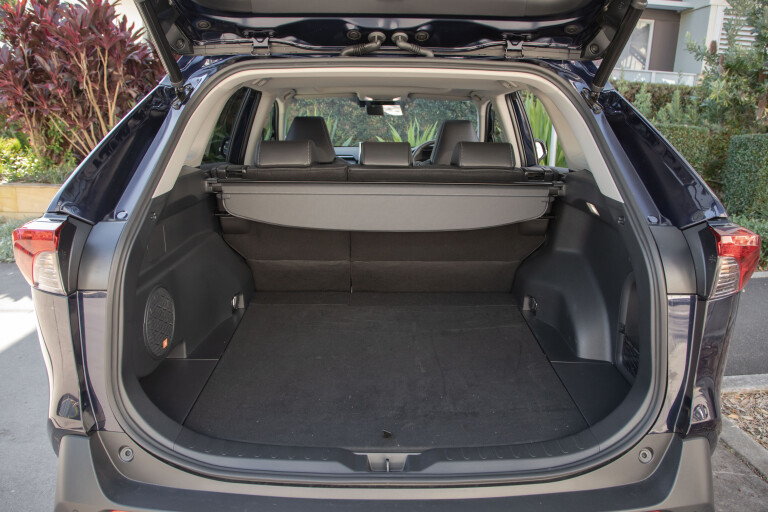
On the road
The most popular power unit in the biggest-selling passenger car in Oz is hardly cutting-edge electrification. But what Toyota’s evergreen petrol-electric system pays are the sorts of dividends so many buyers want: frugal (4.7L/100km claimed) running on cheap (91 RON) fuel, a theoretical 1000-kilometre range and turnkey ICE-like convenience, no plugging in required.
This palatable buy-in is matched by cheap servicing ($230 per year capped). It’s an easy, hassle-free path Toyota has trekked for a good while now, if one increasingly palatable to buyers’ increasing eco-sensibilities.
The front-driven format atmo 2.5-litre petrol four outputs 131kW and 221Nm, which is fairly torquey for an Atkinson cycle engine. Meanwhile, dual electric motor-generators producing a combined 88kW and 202Nm are paired to a nickel-metal-hydride battery.
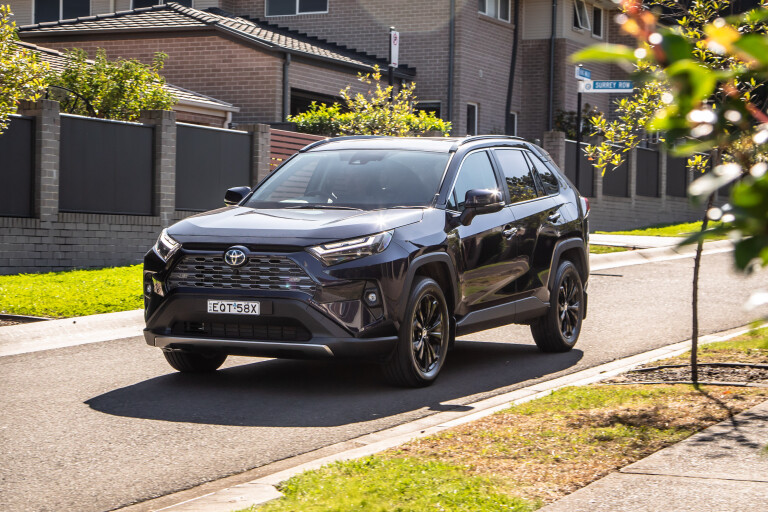
At 160kW total system power, the FWD is just three kilowatts shy of the AWD powertrain that adds a third 40kW and 121Nm electric motor to the rear axle. Toyota doesn’t quote any peak system torque figures.
The RAV4 starts and sets off in electric drive but with any enthusiasm from the driver, its petrol engine rumbles into life. The EV and ICE drive shuffling and blending is noticeable and far from seamless, though drivability is quite polished at a leisurely cruise, where the hybrid system remains fairly quiet and refined.
Dig in and the petrol 2.5 does get raucous. Add the flaring nature of the continuously variable transmission and at times there’s little synchronous about the soundtrack and forward motion.
That said, it’s surprisingly surly and quite linear when accelerating hard, even if little about its character encourages you to do so on a regular basis. But favour more casual inputs and the RAV4 can be downright serene.
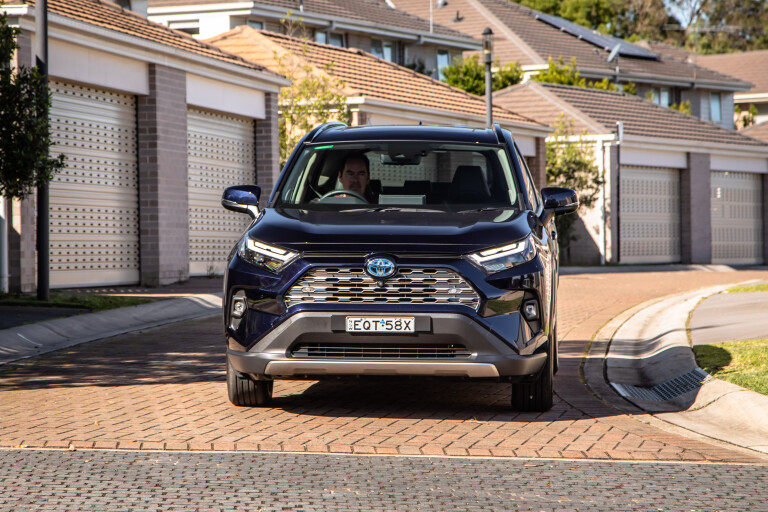
On balance, the mid-sized Toyota SUV delivers much that many owners like but mightn’t necessarily ask for.
It’s a nice size; large and significant enough to underpin and sense of surety yet pleasingly cooperative, thanks to its deceptively keen TNGA underpinnings and accurate steering.
The ride and handling balance is a real highlight. Rather than adopting sporty pretension and rigid nature to justify it, the RAV4 presents a blend of well-judged and nicely rounded compliance with keen body control and genuine driver communication and engagement.
It’s not merely softly set, there’s clearly some considerable effort on Toyota’s part, in tuning and spec, to hone out discomfort from the on-road experience, be it filtering out small road imperfections or investing in noise suppression where it counts. It’s prone to some tyre rumble on coarse surfaces though that is somewhat exacerbated by the RAV4’s usually quiet-running nature.
The RAV4's real strength is that it’s so comfort-focused across such a breadth of driving disciplines, from peak-hour crawl where the hybrid system tends to return its best efficiency best, to open road touring.
But even with long stints stretching its legs, our tester returned consumption safely in the fives.
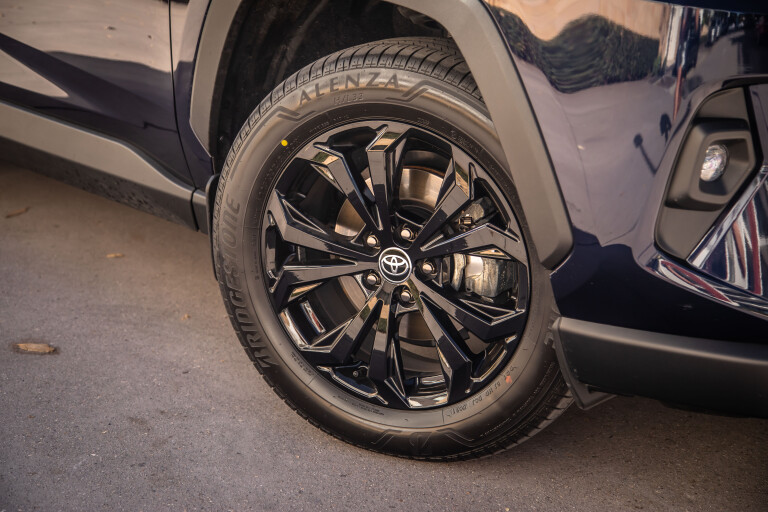
Is it left lacking without all-wheel drive? Not really. It takes a fair effort to get the front tyres scrabbling and even then it’s not caught short on thrust, to the point where digging about for alternative Power or EV drive modes isn’t necessary.
That said, stumping up for all-paw traction might prove the best foil for regional owners who habitually find themselves on mixed surfaces. Or if you’re towing: the FWD’s paltry 480kg braked (or unbraked) trailer capacity jumps to 1500kg in AWD guise.
Shortcomings? Not many.
The lane departure warning does have a low threshold, triggering below 50km/h to an annoying extent on back streets when you’re threading between parked cars and the road centre lines. And the digital rear-view mirror, with its default long-lens camera display mode, is more of a novelty than a genuinely useful convenience.
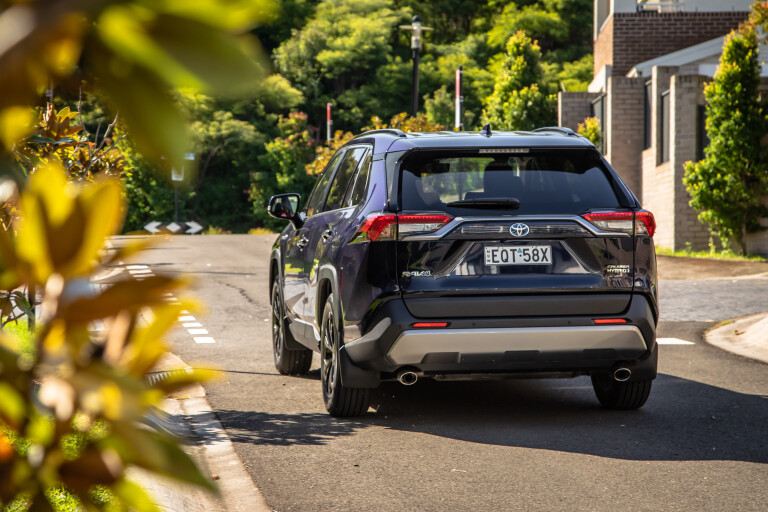
Ownership
The RAV4 is covered by Toyota’s five-year, unlimited-kilometre new vehicle warranty. The hybrid system’s battery is guaranteed for up to 10 years. Service intervals are every 12 months and 15,000kms with each visit is capped at $230 for the first five years.
It’s cheap to service and cheap to run, too. That ‘frugal fives’ fuel economy can be had on crappy 91 RON or E10.
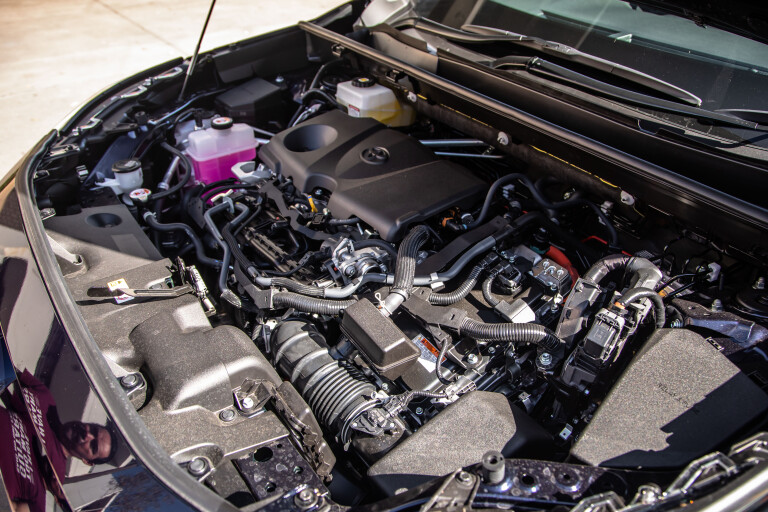
VERDICT
Toyota’s mid-sized family hauler has so many good things going for it that, if it wasn’t the most popular SUV in Australia, it would deserve to be.
That it’s such hot property just goes to prove how this global model fits local tastes and wants oh-so well.
The hybrid factor – with real-world advantages and virtually compromise-free – is just part of the allure though it’s a significant one. That Toyota’s technical take is a bit old hat matters little to buyers shopping for the benefits the RAV4 offers in droves and its only real rival, the Subaru Forester Hybrid, struggles to match.
While there’s a fair argument that the new XSE mid-ranger is a sweeter spot in the RAV4’s recently expanded range, the closely stacked variants make for an easy walk up or down depending on your budget and equipment whim.
At least, that would be the case in a world without year-long waiting lists.
Ink an order now and there’s a fair chance RAV4’s long-suffering infotainment woes – the blackest mark on the current MY22 page – will be rectified by new-generation multimedia once keys land in patient hands.
2022 Toyota RAV4 Cruiser Hybrid 2WD specifications
| Body | 5-door, 5-seat medium SUV |
|---|---|
| Drive | front wheel |
| Engine | 2487cc 4cyl, dohc, 16V, hybrid |
| Compression | 14.0:1 |
| Power | 160kW (total system) |
| Torque | 221Nm @ 3600rpm (engine) |
| Transmission | continuously variable automatic |
| Weight | 1690kg |
| Fuel consumption | 4.7L/100km (claimed) |
| Front suspension | MacPherson strut, coil springs, anti-roll bar |
| Rear suspension | multi-links, coil springs, anti-roll bar |
| L/W/H | 4600/1855/1685mm |
| Wheelbase | 2690mm |
| Brakes | 305mm ventilated discs (front), 281mm solid discs (rear) |
| Tyres | 225/60R18 Bridgestone Alenza |
| Price | $45,750 + on-road costs |
Score breakdown
Things we like
- Frugal and pokey hybrid propulsion
- Enticing ownership credentials
- Roomy and comfy cabin
- Fine ride and handling balance
Not so much
- Outdated infotainment
- The wait on delivery
- Powertrain gruff under load
- Slim towing credentials



COMMENTS